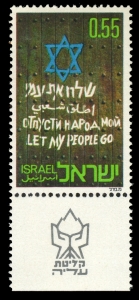
because you were slaves in the land of Egypt
The experience of exodus from Egypt has been a founding event / an indispensable foundation in the shaping of Jewish identity, religion and values, and is inscribed in the first of the Ten Commandments, “I the Lord am your God who brought you out of Egypt, the house of bondage.”[1]
The narrative of slavery and the exodus to freedom is the foundation for numerous mitzvot, commandments in Torah, among them the sanctity of the Sabbath, Passover, Pentecost and Feast of the Tabernacles, and mitzvot such as laying of phylacteries and social justice commandments of treating with compassion the marginalized, the poor, the needy, the widow, the orphan and the Ger, the stranger. The moral ethical call to treat the stranger with compassion has for generations been embedded in the sign, “because you have been strangers in the land of Egypt.”
The rights of the stranger in Torah are repeated and reiterated, the prohibition to take advantage of them, to use them, to overwork them and, moreover, the obligation to love them -.”ואהבתם את הגר” The rights of strangers are anchored in the reminder of the exodus, “for you were strangers in the land of Egypt” (Deuteronomy10: 19).
The Torah commands us to remember the exodus and warns us to never forget what preceded it, the suffering, the hardship, the pain of slavery; throughout history there has also been the ongoing trauma of the Jewish experience as strangers in foreign lands, exploited, humiliated, fleeing for our lives, always admonished not to do unto others what was done to us. It is expressed in Torah in the reminder that Egypt had been at some point a place of refuge for Jacob and his sons who fled famine in Canaan and therefore, “you shall not abhor an Egyptian for you were a stranger in his land.”
Once a year at the Passover Seder we retell the story of the exodus from Egypt and we read the Haggadah to reiterate our commitment to see ourselves personally and in every generation as though we are the ones making the exodus. As the Haggadah commends us, “each person is obligated to see him/herself as though they are the ones coming out of Egypt.”

God’s call to Pharaoh “Let my people go” has become a universal freedom maxim. It was adopted by black people during slavery in the United States and it was the cry in the Soviet Union to let its Jewish citizens go to Israel.
[1] This idea is found in Rabi Judah Halevi’s “Kuzari”‘ (12th century): “and so God opened his words to all of the Israelites –’I the Lord am your God who brought you out of Egypt, the house of bondage’ and did not say: I am the creator of the world of you.”